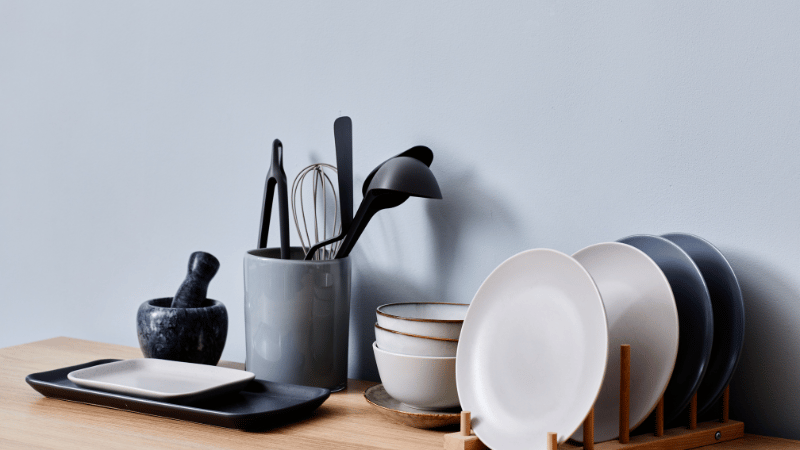Picture this: you’re preparing a delicious meal in your kitchen, the aroma of fresh ingredients filling the air. But have you ever stopped to consider the materials of the tools and cookware you’re using? The health implications of kitchenware are often overlooked, yet they play a significant role in ensuring that the food you prepare is as healthy as possible. Understanding the impact of different kitchenware materials on health and how to accommodate various sensitivities can make a big difference. Let’s explore how to choose healthier culinary tools for your kitchen.
The Importance of Kitchenware Materials
The materials used in kitchenware can affect the quality and safety of your food. Some materials can leach harmful chemicals into food, especially when heated. Others might cause reactions in individuals with specific sensitivities. Here’s a rundown of common kitchenware materials and their impact on health:
Non-Stick Coatings (Teflon)
Non-stick pans are popular for their convenience, but many contain polytetrafluoroethylene (PTFE), commonly known as Teflon. When heated above 500°F (260°C), Teflon can release toxic fumes that may cause flu-like symptoms known as “Teflon flu.” Long-term exposure to these fumes can lead to more serious health issues. Additionally, scratched non-stick surfaces can flake off into food, posing ingestion risks.
Healthier Alternatives:
● Ceramic-coated cookware: Provides a non-stick surface without the risk of harmful fumes.
● Cast iron: Naturally non-stick when seasoned properly, and adds iron to your diet.
Aluminum
Aluminum cookware is lightweight and conducts heat well, but it can react with acidic foods like tomatoes and citrus, leading to aluminum leaching into your food. High levels of aluminum intake have been linked to neurodegenerative diseases.
Healthier Alternatives:
● Anodized aluminum: Treated to prevent leaching and is more durable.
● Stainless steel: Resistant to leaching and highly durable.
Plastic
Plastic kitchen tools and containers can release harmful chemicals like BPA (bisphenol A) and phthalates, especially when heated. These chemicals are endocrine disruptors and have been linked to various health problems, including hormonal imbalances and cancer.
Healthier Alternatives:
● Glass: Non-reactive and safe for food storage and cooking.
● Silicone: Heat-resistant and free of harmful chemicals, ideal for baking mats and utensils.
Copper
Copper cookware provides excellent heat conduction but can react with certain foods, leading to copper toxicity. Most copper cookware is lined with stainless steel or tin to prevent this, but the lining can wear out over time.
Healthier Alternatives:
● Stainless steel-lined copper: Ensures safety while maintaining superior heat conduction.
● Stainless steel: Safe and durable, with good heat conduction.
Accommodating Sensitivities in the Kitchen
Beyond the general health impacts of kitchenware materials, it’s important to consider specific sensitivities that some individuals may have. Here are some common sensitivities and how to accommodate them:
Nickel Sensitivity
Nickel is often found in stainless steel cookware, which can be problematic for individuals with nickel allergies. Symptoms can range from mild skin irritation to severe allergic reactions.
Solutions:
● Nickel-free stainless steel: Specifically designed to avoid nickel allergies.
● Cast iron or enameled cast iron: Naturally nickel-free and durable.
Gluten Sensitivity
For individuals with celiac disease or gluten sensitivity, cross-contamination is a significant concern. Even trace amounts of gluten can cause adverse reactions.
Solutions:
● Dedicated gluten-free kitchenware: Use separate utensils, cutting boards, and cookware for gluten-free food preparation.
● Silicone baking mats and tools: Easy to clean thoroughly, reducing the risk of cross-contamination.
Chemical Sensitivities
Some people are sensitive to chemicals found in various kitchen materials, including plastics and non-stick coatings.
Solutions:
● Natural materials: Use kitchenware made from wood, glass, stainless steel, or untreated cast iron.
● Avoid scented products: Some cleaning products can leave residues that cause reactions. Use fragrance-free, natural cleaning agents.
Tips for Choosing Healthier Kitchenware
Choosing the right kitchenware involves understanding your needs and preferences. Here are some tips to help you make healthier choices:
- Research and Read Labels: Look for kitchenware labeled as BPA-free, PFOA-free and free of other harmful chemicals. Research brands and materials to ensure they meet health and safety standards.
- Invest in Quality: High-quality kitchenware might be more expensive upfront, but it’s a worthwhile investment for your health and longevity. Quality items are more durable and less likely to leach harmful substances into your food.
- Consider Your Cooking Habits: Choose kitchenware that suits your cooking style. For example, if you often cook at high temperatures, opt for materials like cast iron or stainless steel that can withstand high heat without releasing toxins.
- Maintain Your Kitchenware: Proper care and maintenance can extend the life of your kitchenware and keep it safe. Follow manufacturer instructions for cleaning and seasoning, especially for materials like cast iron.
The materials you choose for your kitchenware can significantly impact your health and the quality of your food. By understanding the risks associated with certain materials and opting for healthier alternatives, you can create a safer and more enjoyable cooking environment. Accommodating specific sensitivities in the kitchen further ensures that everyone can enjoy meals without adverse reactions. Take the time to evaluate your current kitchenware and make informed choices that prioritize your health and well-being. A kitchen stocked with safe, healthy tools is the foundation for delicious and nutritious meals.

